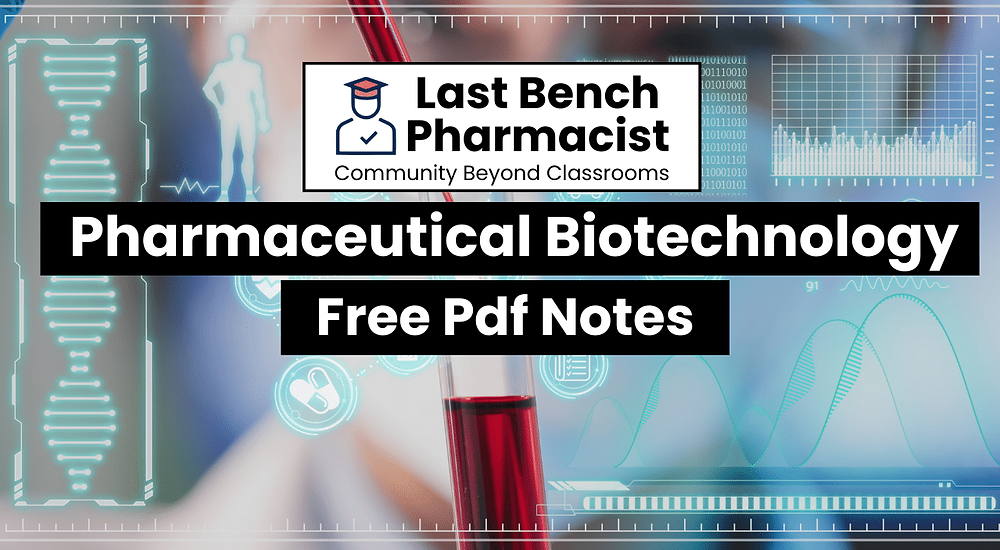



#bpharmnotes #bpharmPharmaceuticalBiotechnology #bpharmpdfnotes
Forget boring textbooks, B-Pharmers! This B Pharm Pharmaceutical Biotechnology PDF Notes is your gateway to the exciting world of Pharmaceutical Biotechnology, where biology and technology join forces to create cutting-edge medicines. Think microscopic superheroes fighting diseases, or tiny factories brewing up life-saving drugs inside living cells. We’ll explore gene editing, fermentation, and other cool stuff that sounds like science fiction, but is actually changing the face of medicine. So, grab your curiosity (and maybe a t-shirt that says “Biotech Wizard”), because understanding this field is the key to unlocking the future of healthcare!
Biotechnology has a long promise to revolutionize the biological sciences and technology. Scientific application of biotechnology in the field of genetic engineering, medicine and fermentation technology makes the subject interesting. Biotechnology is leading to new biological revolutions in diagnosis, prevention and cure of diseases, new and cheaper pharmaceutical drugs. Biotechnology has already produced transgenic crops and animals and the future promises lot more. It is basically a research-based subject.
Upon completion of the subject student shall be able to
Understanding the importance of Immobilized enzymes in Pharmaceutical Industries
Genetic engineering applications in relation to production of pharmaceuticals
Importance of Monoclonal antibodies in Industries
Appreciate the use of microorganisms in fermentation technology
a) Brief introduction to Biotechnology with reference to Pharmaceutical Sciences. b) Enzyme Biotechnology- Methods of enzyme immobilization and applications. c) Biosensors- Working and applications of biosensors in Pharmaceutical Industries.
d) Brief introduction to Protein Engineering.
e) Use of microbes in industry. Production of Enzymes- General consideration – Amylase, Catalase, Peroxidase, Lipase, Protease, Penicillinase.
f) Basic principles of genetic engineering.
a) Study of cloning vectors, restriction endonucleases and DNA ligase.
b) Recombinant DNA technology. Application of genetic engineering in medicine.
c) Application of r DNA technology and genetic engineering in the production of: i) Interferon ii) Vaccines- hepatitis- B iii) Hormones-Insulin.
d) Brief introduction to PCR
Types of immunity- humoral immunity, cellular immunity
a) Structure of Immunoglobulins
b) Structure and Function of MHC
c) Hypersensitivity reactions, Immune stimulation and Immune suppressions.
d) General method of the preparation of bacterial vaccines, toxoids, viral vaccine, antitoxins, serum-immune blood derivatives and other products relative to immunity.
e) Storage conditions and stability of official vaccines
f) Hybridoma technology- Production, Purification and Applications
g) Blood products and Plasma Substituties.
a) Immuno blotting techniques- ELISA, Western blotting, Southern blotting.
b) Genetic organization of Eukaryotes and Prokaryotes
c) Microbial genetics including transformation, transduction, conjugation, plasmids and transposons.
d) Introduction to Microbial biotransformation and applications.
e) Mutation: Types of mutation/mutants.
a) Fermentation methods and general requirements, study of media, equipments, sterilization methods, aeration process, stirring.
b) Large scale production fermenter design and its various controls.
c) Study of the production of – penicillins, citric acid, Vitamin B12, Glutamic acid, Griseofulvin,
d) Blood Products: Collection, Processing and Storage of whole human blood, dried human plasma, plasma Substituties.